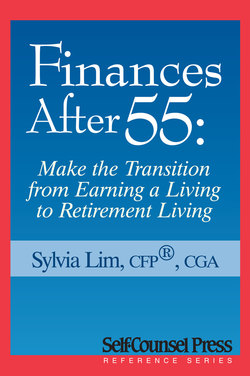Читать книгу Finances After 55 - Sylvia Lim - Страница 8
На сайте Литреса книга снята с продажи.
The Fear Factor
ОглавлениеMany people fear retirement.
To some, it means aging, and in today’s youth-oriented culture, age is not seen as desirable. Others may view retirement as a loss of independence or power. And for those who have already retired, it may symbolize a loss of status and financial security.
As we get older, we may fear that our grown children will be burdened by our increased physical dependence. Along with this fear comes the fear of loss of respect from loved ones.
Fear of developing chronic illnesses is another factor. Again, it will mean becoming more dependent on others and having less control over our own lives and destinies. Fear of falling also comes into play here. It’s been proven that many serious injuries are the result of accidental falls. Many elders become incapacitated and never fully recover their former mobility and independence.
Another big fear for many people is running out of money to support themselves. The image of an old person begging for money, living on the street, and eating in soup kitchens can make anyone anxious about growing old and penniless.
All your fears about retirement and aging are real. They are challenging to your mental health and quality of life. Nonetheless, it’s important to remember that confronting your fears is your best defense. Knowing what those fears are and then systematically dealing with them by planning your retirement can give you back your power and peace of mind.
There are actions you can take to diminish each of these fears. For example, remaining physically active and leading a healthy lifestyle can reduce your chances of developing illnesses. Kicking bad habits such as smoking and excessive alcohol consumption can improve your physical well-being, thereby minimizing your fear of developing terminal diseases.
Participating in meaningful activities can help you maintain your perspective on your usefulness and can bolster your self-esteem, especially if you pick activities that revolve around your interests and beliefs.
Unlike your preretirement phase of life, when your identity was likely connected to what you did for a living, you are no longer defined by your employment. This change can be a huge relief for many people who were plagued by status-conscious work associates. Now they can contribute to society in other meaningful ways, and enjoy doing it without worrying about how other people see them.
Staying physically active can improve your overall well-being. Weight-bearing exercise and calcium supplements can improve your bone density. These and other “good for you” habits will not only make you feel better and stronger, but will also minimize your concerns about falling and injuring yourself.
Staying engaged with life can help you maintain a positive perspective about your future. Join in with friends, neighbors, and loved ones for social events, volunteer activities, and family get-togethers. People are social creatures, and connecting with society prevents loneliness and helps you stay emotionally healthy.
Be realistic about your fears of retirement. Facing up to and tackling them logically will set you up for a great retirement. Statistics show that most retirees are living longer and healthier lives than ever before. For most, there’s no regret.
